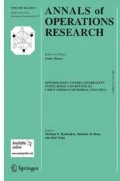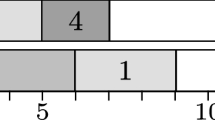Abstract
The problem of optimal scheduling n tasks in a parallel processor system is studied. The tasks are malleable, i.e., a task may be executed by several processors simultaneously and the processing speed of a task is a nonlinear function of the number of processors allocated to it. The total number of processors is m and it is an upper bound on the number of processors that can be used by all the tasks simultaneously. It is assumed that the number of processors is sufficient to process all the tasks simultaneously, i.e. n≤m. The objective is to find a task schedule and a processor allocation such that the overall task completion time, i.e. the makespan, is minimized. The problem is motivated by real-life applications of parallel computer systems in scientific computing of highly parallelizable tasks. An O(n) algorithm is presented to solve this problem when all the processing speed functions are convex. If these functions are all concave and the number of tasks is a constant, the problem can be solved in polynomial time. A relaxed problem, in which the number of processors allocated to each task is not required to be integer, can be solved in O(nmax {m,nlog 2 m}) time. It is proved that the minimum makespan values for the original and relaxed problems coincide. For n=2 or n=3, an optimal solution for the relaxed problem can be converted into an optimal solution for the original problem in a constant time.
Similar content being viewed by others
References
Bernard, P.E., T. Gautier, and D. Trystram. (1999). “Large Scale Simulation of Parallel Molecular Dynamics.” In Proceedings of Second Merged Symposium IPPS/SPDP, 13th International Parallel Processing Symposium and 10th Symposium on Parallel and Distributed Processing, San Juan, Puerto Rico.
Blayo and L. Debreu. (1998). “Adaptive Mesh Refinement for Finite Difference Ocean Models: First Experiments.” Journal of Physics Oceanogr. 29, 1239–1250.
Błażewicz, J., M. Drabowski, and J. Weglarz. (1986). “Scheduling Multiprocessor Tasks to Minimize Schedule Length.” IEEE Transactions on Computing 35, 389–393.
Błażewicz, J., K. Ecker, E. Pesch, G. Schmidt, and J. Weglarz. (1996). Scheduling Computer and Manufacturing Processes. Berlin/New York: Springer.
Błażewicz, J., K. Ecker, B. Plateau, and D. Trystram (eds.). (2000). Handbook on Parallel and Distributed Processing. Berlin/New York: Springer.
Dongarra, J., L. Duff, D. Danny, C. Sorensen, and H. van der Vorst. (1999). Numerical Linear Algebra for High Performance Computers (Software, Environments, Tools). Philadelphia, PA: SIAM.
Drozdowski, M. (1996). “Scheduling Multiprocessor Tasks-An Overview.” European Journal of Operational Research 94, 215–230.
Du, J. and J.Y.-T. Leung. (1989). “Complexity of Scheduling Parallel Tasks Systems.” SIAM Journal on Discrete Mathematics 2, 473–487.
Ludwig, W.T. (1995). “Algorithms for Scheduling Malleable and Nonmalleable Parallel Tasks.” Ph.D. thesis, University of Wisconsin-Madison, Department of Computer Science.
Mounie, G., C. Rapine and D. Trystram. (1999). “Efficient Approximation Algorithms for Scheduling Malleable Tasks.” In Eleventh ACM Symposium on Parallel Algorithms and Architectures (SPAA'99), ACM, pp. 23–32.
Prasanna, G.N.S. and B.R. Musicus. (1995). “The Optimal Control Approach to Generalized Multiprocessor Scheduling.” Algorithmica.
Rapine, C., I. Scherson, and D. Trystram. (1998). “On-line Scheduling of Parallelizable Jobs.” In Lecture Notes in Computer Science, Vol. 1470. New York: Springer.
Scherson, I., R. Subramanian, V. Reis and L. Campos. (1996). “Scheduling Computationally Intensive Data Parallel Programs.” In Ecole Francaise de Parallélisme, Réseaux et Systèmes, Placement Dynamique et Répartition de Charge: Application aux Systèmes Parallèles et Répartis, pp. 107–129. Presquele de Giens: INRIA.
Stanat, D.F. and D.F. McAllister. (1977). Discrete Mathematics in Computer Science. Englewood Cliffs, NJ: Prentice-Hall.
Turek, J., J.Wolf, and P. Yu. (1992). “Approximate Algorithms for Scheduling Parallelizable Tasks.” In 4th Annual ACM Symposium on Parallel Algorithms and Architectures, pp. 323–332.
Weglarz, J. (1981). “Project Scheduling with Continuously-Divisible, Doubly Constrained Resources.” Management Science 27, 1040–1052.
Weglarz, J. (1982). “Modelling and Control of Dynamic Resource Allocation Project Scheduling Systems.” In S.G. Tzafestas (ed.), Optimization and Control of Dynamic Operational Research Models. Amsterdam: North-Holland.
Author information
Authors and Affiliations
Corresponding author
Rights and permissions
About this article
Cite this article
Błażewicz, J., Machowiak, M., Węglarz, J. et al. Scheduling Malleable Tasks on Parallel Processors to Minimize the Makespan. Annals of Operations Research 129, 65–80 (2004). https://doi.org/10.1023/B:ANOR.0000030682.25673.c0
Issue Date:
DOI: https://doi.org/10.1023/B:ANOR.0000030682.25673.c0




